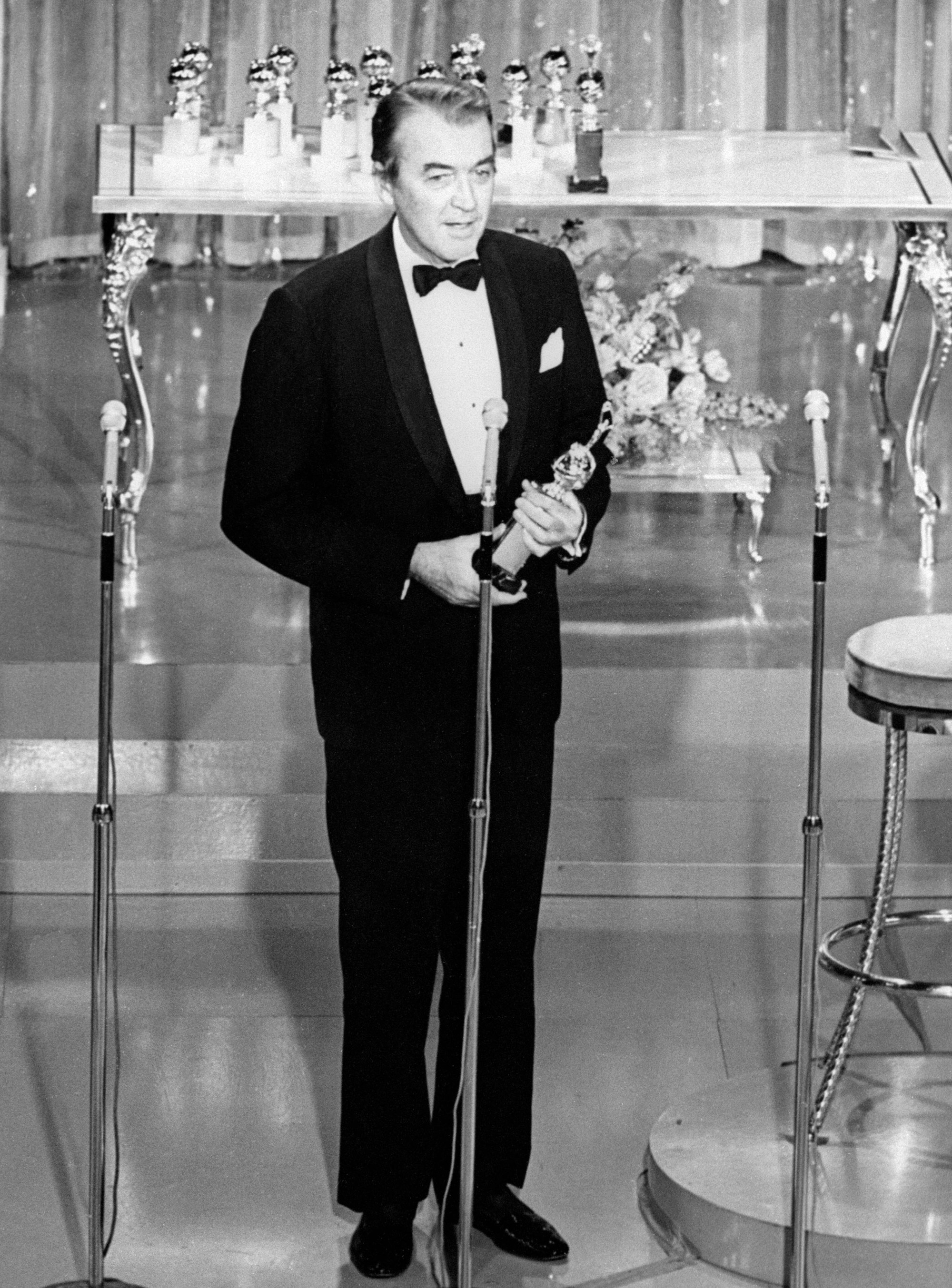
- Cecil B. DeMille
Ready for My deMille: Profiles in Excellence – James Stewart, 1965
Beginning in 1952 when the Cecil B. deMille Award was presented to its namesake visionary director, the Hollywood Foreign Press Association has awarded its most prestigious prize 66 times. From Walt Disney to Bette Davis, Elizabeth Taylor to Steven Spielberg and 62 others, the deMille has gone to luminaries – actors, directors, producers – who have left an indelible mark on Hollywood. Sometimes mistaken with a career achievement award, per HFPA statute, the deMille is more precisely bestowed for “outstanding contributions to the world of entertainment”. In this series, HFPA cognoscente and former president Phil Berk profiles deMille laureates through the years.
The archival photo of Jimmy Stewart accepting his Cecil B. deMille award —to many he was always Jimmy —opens up a flood of memories. What an amazing career he had. Unlike his best friend Henry Fonda, he labored for years under his seven-year contract with MGM, playing the other guy in such forgettable movies as the Jeanette McDonald Nelson Eddy musical Rose Marie, the Janet Gaynor- Robert Taylor romance Small Town Girl, and again in the Taylor- Joan Crawford historical drama Gorgeous Hussy. Only when Fox borrowed him for their remake of Seventh Heaven did MGM realize his potential, finally rewarding him with a co-starring role opposite Margaret Sullivan in The Shopworn Angel.
But it was Frank Capra who made Stewart a bona fide star when Columbia borrowed him for You Can’t Take it With You which won the Oscar as best picture of 1939. David O. Selznick was equally impressed giving him the starring role opposite Carol Lombard in Made for Each Other. But MGM continued to waste his talents on such inane movies as The Ice Follies of 1939 and It’s a Wonderful World.
Again coming to the rescue, Columbia and Capra borrowed him for Mr. Smith Goes to Washington, which gave him an opportunity finally to show his acting chops. For that, he won the New York Critics award for best actor, and the film, in turn, earned him the starring role in Universal Destry Rides Again opposite Marlene Dietrich. It’s one of his five greatest movies.
The next year he won the Oscar for The Philadelphia Story, much to everyone’s surprise. The stars of that movie were Cary Grant and Katharine Hepburn. He had the lesser role, so MGM had little to do with that distinction. It was a consolation prize for not having won the previous year for his impassioned Mr. Smith. Truth be told, the only great film he ever starred in at MGM was the Ernst Lubitsch’s classic, The Shop Around the Corner, arguably the greatest romantic movie of all time. In fact after playing innocuous male leads for seven years MGM’s final reward was to give him top billing over their top stars Judy Garland, Hedy Lamarr, and Lana Turner in Ziegfield Girl.
Fortunately, World War II intervened. He enlisted right away, and after completing 20 combat missions the air, he earned the rank of Brigadier General.
But like so many others, he came back a changed man. His return to movies turned out to be his most beloved film, It’s a Wonderful Life. Even though it was Frank Capra’s masterpiece, at awards season it was eclipsed by Sam Goldwyn’s The Best Years of Our Lives, which went on to win universal acclaim and every award that year including the Golden Globe for Best Picture. Sadly, It’s a Wonderful Life in its initial run was a failure.
As a result, he languished in studio purgatory – his best movie in this period was Call Northside 777 for Fox. Even his first film for Hitchcock, Rope, was a critical and box office disappointment.
Enter movie mogul Lew Wassermann. He steered Stewart into a tax avoidance scheme whereby if the actor formed a corporation he would be taxed at a much lower rate than personal income; so beginning with the Anthony Mann western Winchester ’73 he became the first onscreen talent to receive “points in a film.” Ironically that financial bonanza launched the best ten years of his career.
In short order, he made The Jackpot and No Highway for Fox, The Greatest Show on Earth for deMille and Paramount, and earned an Oscar nomination for Harvey, for Universal. After that, he did a spate of westerns including Bend of the River, The Far Country, and The Naked Spur culminating in The Glenn Miller Story which made him Hollywood’s top box office star.
Now enter Alfred Hitchcock. It was Hitchcock’s Rear Window which made Stewart an iconic Hollywood star and ushered in the most creative period of his amazing career. After that, he worked with Billy Wilder on The Spirit of St. Louis, Otto Preminger on Anatomy of a Murder, and with his perennial “western” director Anthony Mann on The Man from Laramie and Strategic Air Command. And again, in 1957, with Hitchcock in what is now considered his greatest film, Vertigo, which displaced Citizen Kane as the greatest movie of all-time in the prestigious 2012 Sight and Sound poll of international critics and filmmakers.
Ironically like Citizen Kane, it was neither a big box office or critical success at the time. After that, he made many movies from 1960 to 1970 including John Ford’s The Man Who Shot Liberty Valance but this time playing second fiddle to John Wayne. After that, his once great career was essentially over.
But as Tony Curtis once said, you need one recognized classic in your filmography to be considered immortal.
Jimmy had three. It’s a Wonderful Life, The Shop Around the Corner, and Vertigo.

